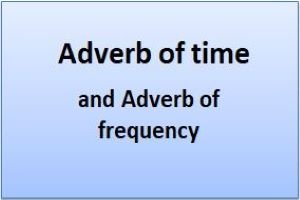Adverb of time and Adverb of frequency:
Adverbs Of Time:
Adverbs of time are words that describe how long something takes to complete and also when or how often something happens.
Adverbs of time are words that modify verbs, adjectives, and other adverbs to indicate when an event occurs. Common adverbs of time include soon, later, yesterday, now, and tomorrow. These words help to create a more specific picture of when something happens. For example, the adverb soon can be used to describe an event that will happen in the near future, while the adverb later can be used to describe an event that will happen at some point after the present moment. Adverbs of time can be used to create a sense of urgency or to indicate the order in which events occur.
Examples of such words include Currently, Now, Often, Recently, Then, Soon, today, Always, Frequently, Tomorrow, Immediately, etc.
Frequency Adverbs:
Frequency adverbs are also time adverbs because they answer the query “How frequently?” or “How rapidly?” They provide us the information about the frequency with which something occurs. Daily, yearly, weekly, monthly, and are some instances.
Frequency adverbs are words that express how often an action is performed. They are often used with the present tense to describe habitual actions. For example, “I always brush my teeth before bed.”
There are a few different types of frequency adverbs, including: always, usually, often, sometimes, and never. Each one expresses a different level of frequency. For example, “I always brush my teeth” means that I brush my teeth every single day without fail. “I usually brush my teeth” means that I brush my teeth most days, but there are occasions when I don’t.
Frequency adverbs can be used on their own, or they can be used to modify other words, such as verbs and adverbs. For example, “I brush my teeth quickly every morning” or “I never brush my teeth for more than two minutes.”
When using frequency adverbs, it’s important to be consistent. If you say “I always brush my teeth,” then you should make sure that you really do brush your teeth every day. Otherwise, people will start to doubt your word choice and might not believe anything you say.
Examples for Frequency adverbs and Adverbs of time:
- The movie is starting now.
- We will visit your school tomorrow.
- When he heard about my accident, He responded immediately.
- I will tell you about my new lifestyle. I swear I’ll do it daily.

